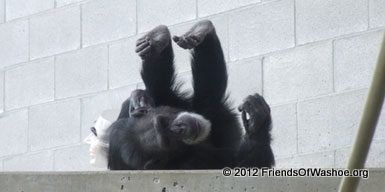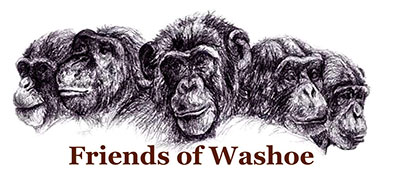
Zoos defend their exhibits as a form of educating the public on the endangered status of animals in their natural environment and to give the public an opportunity to see animals whose relatives are free-living.
Also, the American Zoological Association (AZA) allows zoos to breed animals to create a captive population for the Species Survival Plan (SSP). They justify the breeding by stating that they are maintaining gene pools so that endangered species may be preserved for future generations. This program is said to focus on the species and forget about the individual. It is important to be aware that every SSP program produces a "surplus." Unfortunately, most of the "surplus" animals do not remain in the communities where they were born. They often end up in other zoos, circuses, or roadside zoos. Surplus animals are disposed of as conveniently as possible without regard to what is best for them.
Many chimpanzees in zoos and other forms of captivity will show an increase in frequency of behaviors like: over groomed skin patches on arms and legs, continual rocking, spitting, and feces throwing.
Free-living chimpanzees travel for 60% of their day and can cover as many as 10 kilometers in that time. They also take time to forage for a variety of foods, group and self-groom, play with children and friends, and take naps. Throughout the day, free-living chimpanzees are faced with many challenges, such as defending their territory against strangers, crossing bodies of water, and dealing with conflicts within the group. They always reap the rewards of social living: grooming, playing, and sharing of food and companionship.
Chimpanzees in zoos aren't always given the opportunity to experience the situations that their free-living relatives experience. They aren't given facilities that enable them to travel distances, problem solve, or forage for their own food.
Even though some zoos are improving their facilities, chimpanzees and other animals are still caged in inhumane and lonely conditions. They may be isolated in single cages or placed in outdoor areas surrounded with cement and separated by moats with water in them. Moats can be extremely dangerous. Chimpanzees have very dense bones; and because of this they are not able to float in water. If a chimpanzee falls into a moat, he/she will likely drown.
The zoos that have improved their facilities have done so by incorporating enrichment into the chimpanzees' area. The Detroit Zoo is not only improving the environments but is also committed to not importing animals who were once free-living. The Detroit Zoo is trying to celebrate and save wildlife. Based on this philosophy, the zoo has chosen to adopt animals who were once raised as exotic pets and/or have been retired from entertainment. The zoo director, Dr. Ron Kagan, believes that zoos need to also embrace the ethical treatment of animals and act upon this belief. Unfortunately, not all zookeepers and administrators believe in preserving free-living species and/ or providing adequate housing and enrichment for chimpanzees already in captivity.

